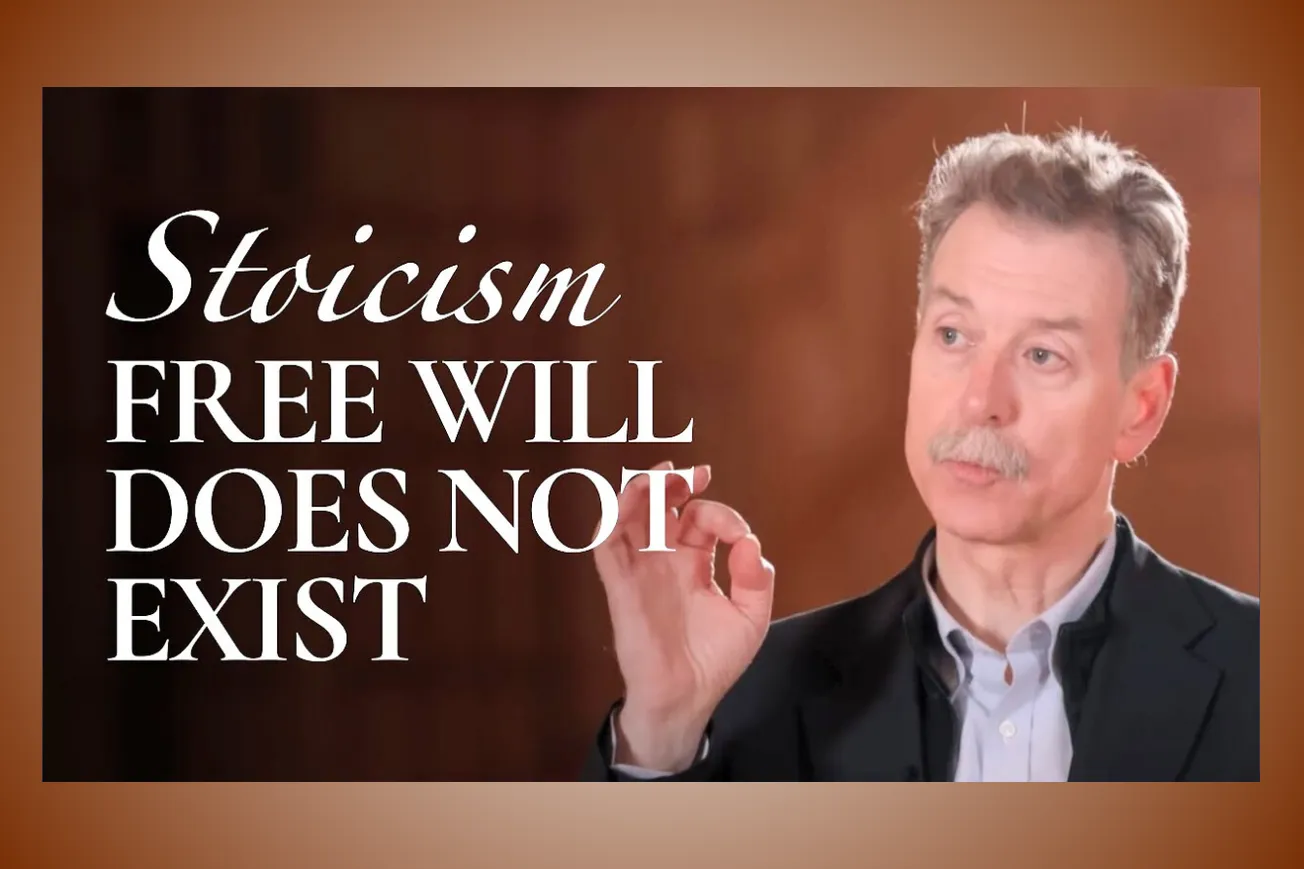Table of Contents
Most people misunderstand Stoicism's core teaching about control, missing a fundamental philosophical contradiction that influenced centuries of Western thought on freedom and responsibility.
Stoic philosophy promises control over our thoughts and emotions while maintaining everything is predetermined by fate, creating an intellectual paradox that scholars like Tad Brennan argue represents a "fundamental bait and switch."
Key Takeaways
- Stoics believed in complete determinism through Zeus's divine plan while simultaneously claiming our thoughts and emotions are "up to us"
- The Stoic notion of control is actually about actions reflecting our character, not genuine causal freedom from determinism
- Zeus represents either arbitrary divine will or natural laws, fundamentally changing how we interpret Stoic ethics and responsibility
- Attempts to secularize Stoicism fail because the theology is inseparable from their view of human nature and virtue
- Stoic compatibilism influenced Western philosophy's evolving conception of the self and moral responsibility
- The "inner citadel" metaphor misleads people into thinking Stoics offered genuine causal insulation from external forces
- Stoic deliberation operates like fact-finding about Zeus's will rather than creating an open future through choice
- This philosophical tension contributed to Christianity's increasingly narrow conception of free will and the self
Timeline Overview
- 00:00–01:41 — Introduction to the central paradox: How can Stoics believe in both complete determinism and personal control?
- 01:41–17:16 — Exploring Stoic fate: Zeus as divine orchestrator, determinism vs natural laws, and theological foundations
- 17:16–30:31 — What's "up to us": ascent, impressions, and the illusion of control in a determined universe
- 30:31–43:54 — Reconciling contradictions: Character-based responsibility, the "bait and switch," and practical implications
- 43:54–END — Legacy and influence: How Stoic ideas shaped Western concepts of freedom, responsibility, and the shrinking self
The Stoic Universe: Fate, Zeus, and Divine Determinism
Stoic philosophy begins with a startling premise about reality's fundamental structure. According to Tad Brennan, fate in Stoicism refers to "a network of causes that extends through all time and through all places." Every event stems from previous events in an unbroken causal chain rooted in Zeus, the main god who permeates all matter, space, and time.
- Zeus functions as both the active principle animating the universe and the orchestrator of all witnessed events, creating a comprehensive deterministic framework
- This determinism differs from modern natural law determinism because Stoics may view causation as Zeus's individual fiats rather than generalizable principles
- The distinction matters ethically: natural law determinism suggests predictable patterns, while arbitrary divine will requires particular obedience to Zeus's commands
- Stoics justify their deterministic worldview through logical arguments about bivalence, divine benevolence, and the impossibility of uncaused events
- The providential aspect means everything unfolds according to the best possible plan, though this remains controversial among interpreters
- Brennan argues we cannot definitively determine whether Stoics viewed Zeus as operating through natural laws or arbitrary divine commands
The theological foundation proves essential to Stoic ethics. As Brennan explains, "The proposal to secularize stoicism is hopeless" because their conception of human nature depends entirely on viewing humans as fragments of Zeus's divine substance.
The Illusion of Control: What's Really "Up to Us"
Stoics claim our thoughts, desires, and beliefs are fundamentally "up to us," centering on the psychological process called ascent. In Stoic psychology, all mental states reduce to either assenting to or suspending judgment about impressions that arise in consciousness.
- Ascent operates like a computer program parsing rational propositions—we encounter impressions and choose whether to accept them as true
- This extreme cognitivism means emotions consist primarily of propositional content plus our assent to specific judgments about situations
- The theory suggests we can achieve perfect rationality by training ourselves to assent only to true, clear impressions while rejecting false ones
- However, ascent requires preconditions like mental clarity that remain outside our control, as Marcus Aurelius acknowledged regarding cognitive decline
- Brennan identifies this as a "fundamental bait and switch"—Stoics appear to offer causal freedom but actually provide something much more limited
- The promise of an "inner citadel" exempt from causal determination contradicts Stoic materialism and their belief that minds consist of the same physical substance as everything else
The reality proves more constrained. Our ascents remain fully determined by the causal network, including our antecedent character, making genuine choice impossible within Stoic metaphysics.
Character, Responsibility, and the Compatibilist Solution
Stoics resolve the apparent contradiction through a sophisticated compatibilist approach to moral responsibility. Rather than requiring causal freedom, they ground responsibility in character expression and authentic self-reflection.
- Moral responsibility depends on actions accurately reflecting our current character rather than requiring alternative possibilities at the moment of choice
- We become blameworthy because our actions stem from who we are, not because we could have magically chosen differently in identical circumstances
- Character formation occurs gradually through accumulated choices and influences, creating a kind of indirect control over our future responses
- The Stoic position maintains determinism while preserving moral assessment by focusing on character as the proper target of praise and blame
- This framework influences centuries of philosophical debate about reconciling determinism with ethical practices and personal accountability
- Brennan notes that folk psychology still craves more robust freedom than compatibilism provides, making the theory perpetually unsatisfying to ordinary intuitions
The lazy argument challenges Stoic determinism by suggesting we should passively accept whatever fate brings. Stoics respond that outcomes and our responses are "co-fated"—both predetermined together rather than independently.
Deliberation as Divine Detective Work
Stoic deliberation operates fundamentally differently from ordinary decision-making because it treats the future as already fixed rather than open to creation through choice.
- Deliberation becomes fact-finding about Zeus's will rather than selecting among genuinely open possibilities for personal action
- When considering options like transportation methods, Stoics examine environmental impact, health benefits, and practical considerations as clues about divine intention
- The content remains similar to normal deliberation, but the framework shifts from "What will I do?" to "What does Zeus want me to do?"
- This approach preserves the psychological experience of weighing options while maintaining consistency with deterministic metaphysics and theological commitments
- Stoics cannot assent to false beliefs about open futures, so they must reframe deliberation to avoid contradiction with their philosophical principles
- The practice resembles searching for lost keys—assuming facts exist and require discovery rather than creation through autonomous choice
This reframing allows Stoics to maintain practical engagement with decision-making while avoiding the metaphysical commitment to genuinely open futures that their determinism precludes.
The Shrinking Self: Stoicism's Legacy in Western Philosophy
Stoic ideas about freedom and responsibility profoundly influenced subsequent Western philosophical development, particularly regarding conceptions of selfhood and moral agency.
- Stoicism contributed to a progressive "shrinking" of the self in Western thought by treating desires and character traits as potentially external constraints
- This vacillation between viewing desires as internal aspects of identity versus external forces created lasting philosophical tensions
- Later Christian and modern philosophers inherited this ambivalence, leading to increasingly narrow conceptions of genuine freedom and moral responsibility
- The demand for freedom "even from our own desires" emerged from taking Stoic insights about external constraints and applying them internally
- Kant and other modern philosophers sought causal insulation not only from external circumstances but from internal psychology as well
- This trajectory moved from Plato's "fat" conception of the self encompassing desires and character to Christianity's "skinny" conception focusing on pure will
Brennan argues this represents both a flaw in Stoicism and an influential legacy that continues shaping contemporary debates about determinism, responsibility, and personal identity.
Why Secularization Fails: The Theological Core
Attempts to extract Stoic ethics from its religious context fundamentally misunderstand the philosophy's anthropological foundations and logical structure.
- Stoic anthropology depends on viewing humans as rational fragments "torn off" from Zeus's divine substance rather than merely biological organisms with rational capacities
- The claim that only rationality matters for human flourishing requires theological justification rather than secular observation of human nature
- Secular approaches cannot adequately explain why physical health, relationships, and material conditions become completely irrelevant to genuine happiness
- The Stoic physics treats human souls as composed of the same pneuma (airy, fiery substance) that constitutes Zeus's active principle throughout reality
- Marcus Aurelius's "atoms or providence" presents a reductio rather than equivalent ethical foundations, suggesting secular alternatives lead to Epicurean materialism
- Without theological grounding, the Stoic position that virtue alone suffices for complete happiness becomes arbitrary and unmotivated
Modern attempts to preserve Stoic insights while discarding religious elements therefore miss essential components that make the original system coherent and compelling.
Common Questions
Q: How do Stoics reconcile complete determinism with moral responsibility?
A: They ground responsibility in character expression rather than requiring causal freedom or alternative possibilities.
Q: What makes Stoic control different from genuine free will?
A: Stoic "control" means actions reflect our character, not that we have causal exemption from determinism.
Q: Why can't Stoicism be successfully secularized according to Brennan?
A: Because their anthropology and ethics depend fundamentally on theological claims about human nature as divine fragments.
Q: How does Stoic deliberation work if the future is predetermined?
A: It becomes fact-finding about Zeus's will rather than creating open futures through autonomous choice.
Q: What is the "bait and switch" in Stoic philosophy?
A: Promising genuine control while actually offering only character-based determinism within a fully causal universe.
Stoic philosophy's central paradox between fate and freedom reveals deep tensions that continue influencing Western thought about responsibility, selfhood, and human agency. Understanding these contradictions illuminates both ancient wisdom and modern philosophical challenges about living meaningfully in a potentially determined universe.





